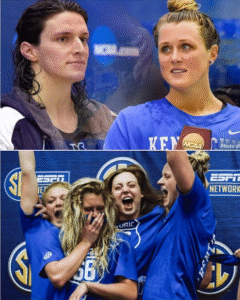The Claim and Its Spread
A post circulating on social media boldly proclaimed:
“IT’S DONE — NCAA has announced the complete transfer of all medals awarded to Lia Thomas to Riley Gaines.”
The narrative suggests that the NCAA formally withdrew all awards from Thomas and reassigned them to Gaines. The claim appears in Facebook posts, shares, memes and image‑macros, often with dramatic emphasis and little in the way of sourcing. One such post claimed a “huge win” for “fairness in women’s sports” and portrayed the NCAA as correcting a prior “mistake.”
However: this claim has been fact‑checked by multiple independent outlets and found to be false. AP News+2PolitiFact+2 The NCAA has confirmed that no such transfer has occurred, and that Thomas’ results remain intact.
What Really Happened
Here are the facts as confirmed by credible sources:
-
In the 2022 NCAA Division I Women’s Swimming and Diving Championships, Lia Thomas (University of Pennsylvania) became the first openly transgender woman to win an NCAA Division I individual title (the 500‑yard freestyle). She also tied for 5th place with Riley Gaines in the 200‑yard freestyle final. PolitiFact
-
The NCAA awarded trophies (not medals) for the top eight finishers in each event. An NCAA spokesperson clarified that the competition results are final and that no reassignment of awards has occurred. AP News
-
The claim of “transferred medals” originated from a satire site (SpaceXMania) and was later shared on other sites and social media without sufficient disclaimers. PolitiFact+1
-
Media fact‑checkers, including Reuters and AP, have labeled the story as false. Reuters writes: “No evidence that medals have been reassigned.” Reuters
In short: the NCAA did not announce a transfer of awards, and the claim has no verifiable foundation.
Why the Claim Gained Traction
This false story emerged in a broader context of intense public debate around transgender athlete participation in women’s sports. Some factors that contributed to its spread:
-
Heated cultural and political context: The participation of Thomas in women’s events sparked significant controversy and media attention, which created fertile ground for sensational claims and viral memes.
-
Simplified narrative of “correction”: The meme that the NCAA “corrected” what some see as an unfair outcome resonates with certain audiences, making the false claim more appealing and shareable.
-
Social media dynamics: Posts are often read and shared without verification; satire content may be taken at face value, then amplified far beyond its original context.
-
Confirmation bias: Individuals who believe that male‑to‑female transgender athletes have had unfair advantages may be more inclined to accept claims of “medal reassignment” as a vindication of their view.
The NCAA, Thomas and Gaines: The Real Story
Lia Thomas: An accomplished swimmer who competed for Penn’s men’s team before transitioning. In 2022 she joined the women’s team and won the NCAA title in the 500‑yard freestyle. espn.com
Riley Gaines: A former University of Kentucky swimmer who tied with Thomas for 5th in the 200‑yard freestyle at the same meet. Since then, Gaines has become an outspoken advocate on issues of women’s sports and transgender athlete policy. Wikipedia
The NCAA’s rules around transgender participation have undergone changes since 2022. A key component of the discussion is balancing fairness, safety, and inclusion under Title IX and NCAA policy. But there is currently no official policy, announced award reassignment, or documented transfer of Thomas’ awards.
The Importance of Accuracy in Sporting Records
Why does this false claim matter? Several reasons:
-
Integrity of competition: Accurate records are part of what gives sport legitimacy. False claims about medal reassignments undermine that trust.
-
Reputation and rights of individuals: Both Thomas and Gaines are individuals whose athletic efforts and identities matter. Misinformation can unfairly affect how they are viewed and treated.
-
Policy implications: The broader debate around transgender participation in sports is complex and evolving. False narratives can derail or polarize discussion and make policy‑making harder.
-
Public trust in institutions: The NCAA, media, and fact‑checkers all have roles in ensuring accurate information. Stories like this illustrate how easily misinformation can erode trust.
Lessons for Consumers of Sports Media
When encountering claims about sporting bodies, awards, and records, it’s wise to:
-
Check the source: Is the story from the official organization (in this case the NCAA) or from a verified news outlet?
-
Look for verification: Does an official statement or credible document confirm the claim?
-
Watch for satire or parody tags: Many false claims originate in parody sites that look like news.
-
Consider motive and context: Is the story feeding into an existing narrative or agenda that might predispose certain audiences to accept it?
-
Consult fact‑checkers: Multiple reliable outlets have evaluated this claim and found it false. AP News+2PolitiFact+2
The Current Status
As of now:
-
Thomas’ 2022 NCAA results remain official.
-
Gaines has not been awarded any reassigned medals or titles by the NCAA.
-
The NCAA has not made any public announcements transferring medals or trophies between Thomas and Gaines.
-
The story remains a viral myth rather than a verifiable event.
Conclusion
The claim that “IT’S DONE: NCAA has transferred all medals awarded to Lia Thomas to Riley Gaines” is false. It arose from a satirical article and was amplified by social media, but lacks any basis in fact. The ongoing public debate about transgender athletes in women’s sports is real, complex and significant — but it deserves accurate information, not sensational misinformation.
In the end, the facts are clear: the NCAA has not redistributed Thomas’ awards, and the narrative of re‑assigned medals is not grounded in any official record. For anyone following this story, the lesson is to rely on verified sources, question sensational headlines, and recognize how quickly misinformation can propagate—even in high‑profile policy arenas.


